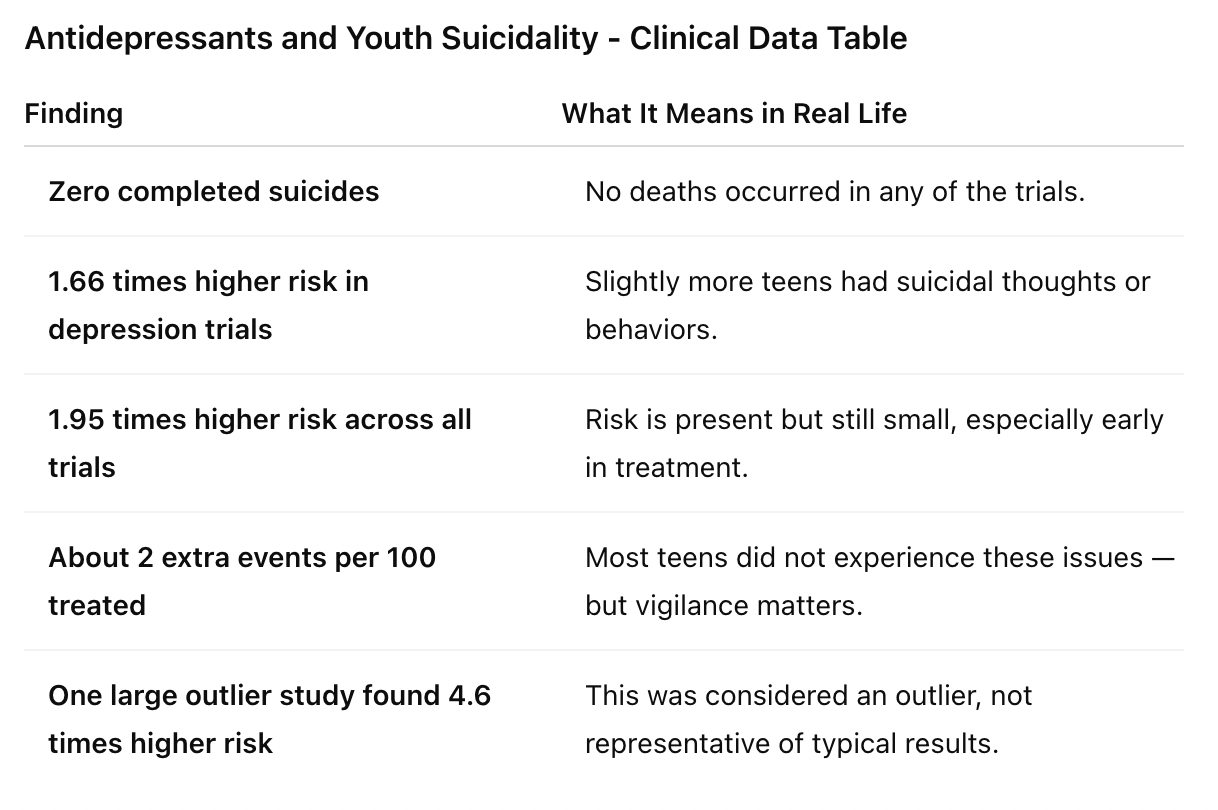The Black Box warning on Antidepressants
Antidepressants can help teens, but early monitoring is crucial for safe treatment.

Dr. Harsh Patel
Psychiatrist & Mindfulness Expert

Are Antidepressants Dangerous for Teens? The Truth Behind the Black Box Warning
Description:
In 2004, the U.S. Food and Drug Administration (FDA) issued a "black box warning" — the most serious safety alert — on antidepressants prescribed to children and teens. It followed a large meta-analysis (a study combining data from many trials) examining the risk of suicidal thoughts and behaviors in young people taking these medications. Published in leading journals like BMJ and The Journal of the American Academy of Child & Adolescent Psychiatry, the data sparked debate that continues today.
The Takeaway
Are antidepressants risky for teens? The short answer: there's a small but real increase in suicidal thoughts or behaviors when treatment starts — especially in the first few weeks — but no increase in actual suicides in the trials reviewed.
The numbers:
- Across 23 studies with over 4,400 youth, there were zero completed suicides.
- But there was a 1.66 times higher risk of suicidal thoughts or behaviors in teens treated for depression.
- In real terms: about 2 extra teens per 100 experienced these thoughts or behaviors compared to those not on medication.
Bottom line: It’s not about avoiding treatment — it’s about starting it carefully, watching closely, and combining it with therapy.
Why Should You Care
If you’re a parent or a young person considering treatment, hearing “antidepressants” and “suicidality” together can be terrifying. But understanding the real risk helps you make informed, grounded decisions.
Here’s the perspective: Across all trials, the increased risk translated to about 2 additional events per 100 youth treated. With the right monitoring and support, many teens improve safely.
The Article

This data comes from an FDA-sponsored meta-analysis, published in respected, peer-reviewed journals like BMJ and JAACAP. It pooled results from 23 gold-standard randomized controlled trials (RCTs) — the most reliable type of clinical research. In short, the science behind the warning is solid, but the story is more nuanced than many headlines suggest.
The Clinical Data
Here’s what the numbers showed:

One large outlier study found a 4.6 times higher risk — but that wasn’t typical across the full data set.
Study Design: How They Figured It Out
- Type: FDA-funded meta-analysis (study of studies)
- Participants: Over 4,400 youth, typically ages 6 to 18
- Trials Included: 23 randomized controlled trials — the gold standard for medical research
- Treatments Studied: SSRIs (Selective Serotonin Reuptake Inhibitors) and other antidepressants
- Published in: BMJ and JAACAP
The FDA reviewed these trials to assess safety, leading to the black box warning still seen on antidepressant labels today.
Why This Study Changed My Practice
Before this research, prescribing antidepressants to teens felt fairly straightforward — write the script, hope for improvement. But after seeing this data, my approach shifted.
Now, I tell families:
“The medication helps clear the fog, but early on, we watch the weather closely.”
Here’s what I do differently:
- I monitor teens especially closely in the first few weeks.
- I have honest, transparent conversations about risks and benefits.
- I never rely on medication alone — pairing with therapy adds a layer of safety and support.
- I work to reduce stigma, not fuel fear — most teens tolerate these medications well when carefully monitored.
What Patients (and Parents) Should Know
- Medication ≠ quick fix. It helps many teens, but isn’t a magic solution.
- Early monitoring is key. Most risk of suicidal thoughts occurs in the first few weeks.
- Zero completed suicides. Across all trials, no deaths occurred — this is about thoughts and behaviors, not inevitable harm.
- Therapy strengthens the plan. Combining counseling with medication improves safety and outcomes.
- Parents are essential. Stay involved, ask questions, and trust your instincts.
Final Thought
The black box warning wasn’t meant to scare families away — it was meant to encourage thoughtful, cautious treatment. With proper monitoring, open conversations, and support, antidepressants can be life-changing for teens battling depression or anxiety.
The bottom line?
Don’t fear treatment — fear untreated depression. With the right plan, your teen can feel better, safely.
🔗 Link to the study: https://pubmed.ncbi.nlm.nih.gov/16520440/






